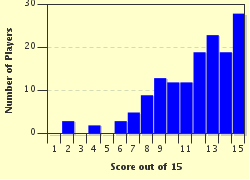Quiz Answer Key and Fun Facts
1. Various dates have been given for the first opera composition. Claudio Monteverdi composed the first opera that still is regularly performed, and that had its first night in 1607. Who is the title character from this opera, who enters Hell to retrieve his deceased wife?
2. Opera may have been an Italian invention, but even in the seventeenth century the French took up opera as well. One of the first French composers was Jean-Baptiste Lully, who created in 1670 an opera named "Le bourgeois gentilhomme" ("The Would-Be Noble"). Who wrote the theatre play on which the opera is based?
3. The English opera also started in the Seventeenth Century. Henry Purcell composed an opera dealing with a love story taken from the "Aeneid" by Virgil. In the eponymous opera by Purcell, which Queen of Carthage falls in love with Aeneas?
4. George Frederic Handel is perhaps the best known British composer during the Eighteenth Century. At which song in the oratorio "Messiah" does everyone stand up, even the English King or Queen?
5. Who composed the famous "Four Seasons" and would also have authored sonnets to accompany these string concerti?
6. Wolfgang Amadeus Mozart has left us so many highlights of classical music, you can't record them on 100 CD's. Apart from all his symphonies and concerti for various instruments, he also left us more than twenty operas. Who is invoked in the title of Mozart's final symphony, Symphony number 41?
7. Giuseppe Verdi was a prolific opera composer. When he was buried in 1901, the crowd attending the funeral spontaneously burst out in Verdi's first successful opera choir: the Chorus of the Hebrew Slaves. From which opera composed in 1843 stems this choir?
8. Bedrich Smetana composed "The Bartered Bride", which premiered in 1870. What is the bride's name in this opera?
9. Georges Bizet's best known opera was subject of fierce critics at the prime night in 1875. Rumour has it that Bizet was so upset with these critics that he died only two months after the premiere of this opera. What was the title of this opera, named after the Spanish heroine?
10. The German opera in the Nineteenth Century was dominated by Richard Wagner. Which of the following people was the eponymous hero in the third instalment of Wagner's magnum opus, "The Ring of the Nibelung"?
11. Pyotr Tchaikovsky (1840-1893) is best known for his three ballets. In his ballet "The Nutcracker", what is the first name of the girl who goes out to meet the Nutcracker Prince?
12. The German composer Richard Strauss has based one of his operas on an ancient Greek theatre play. What was the title of this opera, first performed in 1909?
13. Alban Berg was an Austrian composer. His operas build on the dodecaphony propagated by Arnold Schoenberg, but include more emotion. What is the title of Berg's first and only complete opera?
14. The English composer Benjamin Britten has gained much fame with his opera about a poor fisherman named Peter. What is this fisherman's surname?
15. The American Philip Glass dedicated in 1980 an opera to Mahatma Gandhi. What was the title?
Source: Author
JanIQ
This quiz was reviewed by FunTrivia editor
kyleisalive before going online.
Any errors found in FunTrivia content are routinely corrected through our feedback system.


